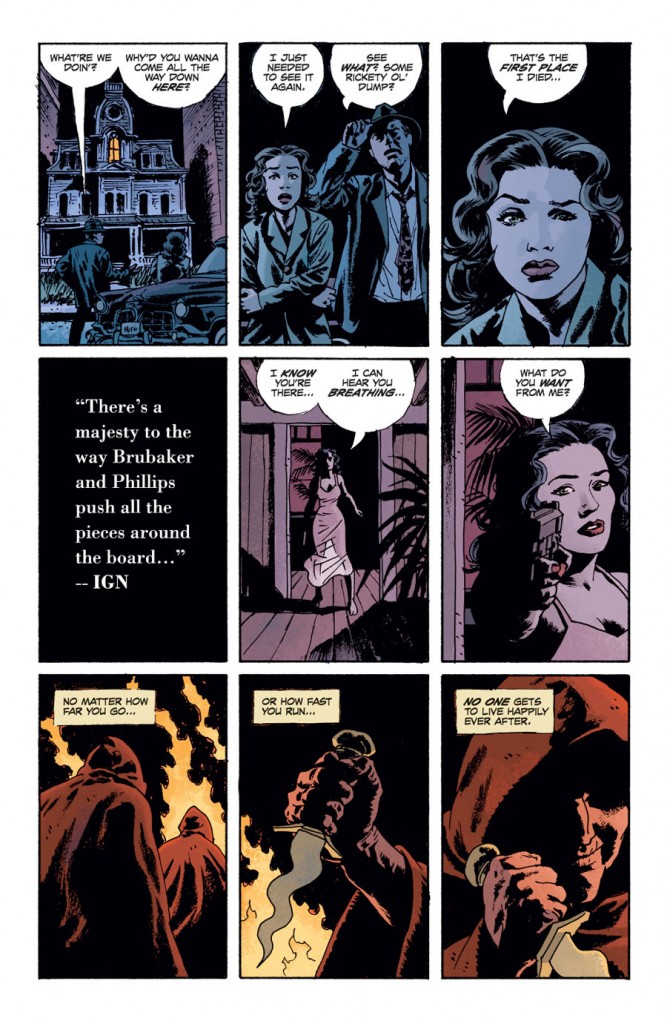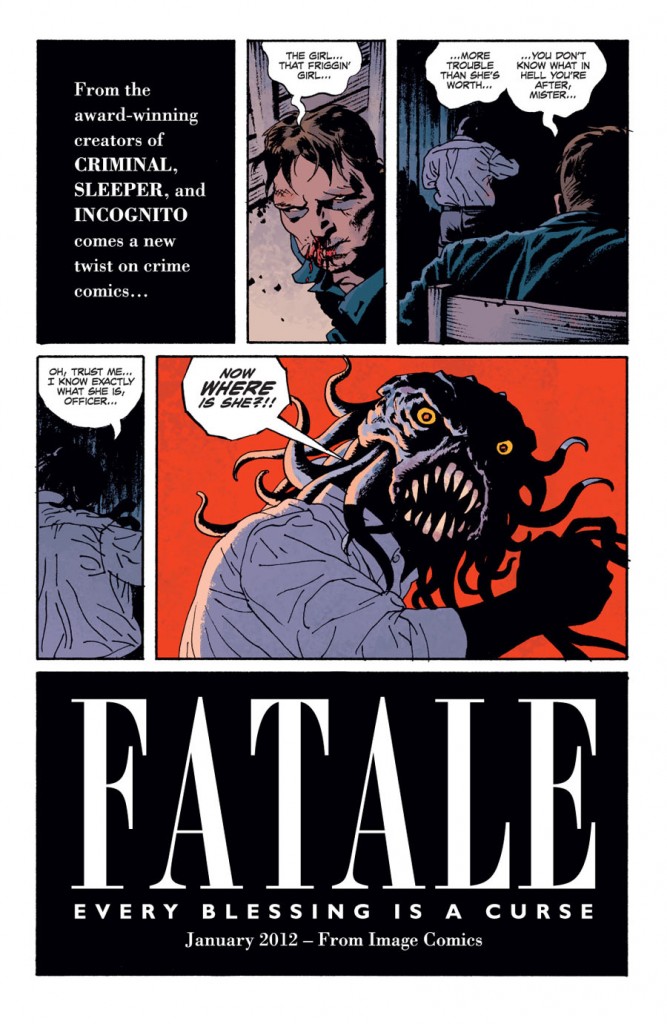Ten Things: SAGA
/It's the periodical-type comic I'm most excited about right now-- SO, THAT MEANS 10 THINGS about SAGA by Brian K. Vaughan, Fiona Staples, human beings who work for or with or under the name of Fonografiks, and Eric Stephenson; copyright Brian K. Vaughan & Fiona Staples. There are SPOILERS because it's the internet and spoiling life is what we do here.
(P.S. two weeks in the "10 thing" conceit is already falling apart! Two weeks, it didn't even last. But ... oh well, "10 Things" still sounds better to me than "boring rambling mess because Abhay is too lazy to try to write essays lately". Other ones can't be this long because the whole point of doing this was to not do something long; I'm going to spend 5 minutes on the next one; sorry about this one. Feel like I get a little pompous in this one, too, like I guess I do sometimes aka all the time; sorry about that. Or I'm too complimentary, and six months from now that book could just go completely into the toilet and this'll all be completely embarrassing-- or let me rephrase that as "more embarrassing" because ha-ha, writing about comics on the internet, whee. But. You doing okay? I don't ask enough; I hope you're doing okay. Anyways, let's get into character...)
The plot of SAGA is ... Well, I don't really know how to complete that sentence with too much certainty.
So far, so far, it's been a story narrated by a baby, about the baby's parents, on the run. But: is SAGA the story of the baby or the story of the parents? The baby is narrating so how long do the parents live? Could the parents die at any moment? Could the comic skip ahead 15 years next issue and show us the baby's teen years, if it wanted to? I'm going to wild, wild guess the comic ends with the baby-character being an adult who has her own kid-- everything inbetween though I couldn't even begin to guess; still is totally up-for-grabs.
What's remarkable isn't that all of the moving parts feel so colloidal after four issues-- a lot of other comic creators pad their fucking comics; that's not remarkable at all. It's that it's so easy to imagine the version of what I'm describing that doesn't work, that feels slow, aimless, adrift, and yet ... "FAMILY ON THE RUN" and the total confidence of Vaughan's voice, that's been enough so far. I went in to SAGA with that chip on my shoulder of "everybody quit vamping, learn how to cut from panel to panel, old comics had reasons for putting a lot of narration or expository dialogue, and you not knowing or acknowledging what they were doing makes you ignorant, not sophisticated, i read manga you're not manga"-- but with SAGA, haven't cared yet, anyways. They can take their time; I'm in.
It's worth noting that I haven't really dug Vaughan as a comic writer before SAGA.
EX MACHINA lost me early-- when the politics kicked in, it had the reek of Aaron Sorkin to it, of Sorkin's desire to write about politics but by bullshittily ditching everything truly political and replacing the political with its exact opposite, the romantic. Maybe it got better later on, though-- yay, criticizing serial comics.
And sure, Y THE LAST MAN? Again, not my book-- I had an Uncanny Valley problem of just constantly sitting there going, "Nope, that's not how the world would be." What an asshole! I was That Guy. But it started with a question of what the world would be like if all the men died, and almost immediately, had the main characters battling homicidal lady-hobos or... something. If all the men died, women would become homicidal hobos, right away, like lickety-split...??? Damn, ladies, damn. Maybe that's what we'd find out if some of you fellas passed the Bechdel test more often, the Secret Hobo Fantasies of the Fairer Sex. Y THE LAST MAN certainly persuaded me as to Vaughan's skills with a cliffhanger, but I was less persuaded by his skills with extrapolation which seemed of a more paramount importance with that book's premise. 
And so, SAGA. And yes, I've noticed those of you not persuaded by SAGA, complaints that it echoes occasionally certain deficiencies of those earlier works. Vaughan's sensibility sometimes leans cute-- I don't think SAGA is actually a cute book, but SAGA has enough surface cute to be fooled about that. The way he names characters, sometimes-- that. Plus, Vaughan's dialogue leans to a "geek-friendly" style which sometimes reminds of Joss Whedon-- I don't mean that as a compliment. The desire of the clever to show off their cleverness, to celebrate it, lacks much appeal, suggests a lack of anything deeper, greater, richer than clever.
That pride sometimes bleeds through with Vaughan's dialogue-- it's not as soaked in it as a Whedon thing, but it's there, sometimes, I suppose. So, I note the various concerns I've seen people express with SAGA, and I note the moments in the book that I would guess have caused them those concerns. But I would say that I went in knowing those moments would be there, and knowing that, was more able to move past them and see around them to SAGA's merits...?
Let's stop a moment and note the context that these SAGA comics are being published in.
Posit, for a moment, a fantasy world where you yourself live in a slave state. In this slave state, let's say that... the freedom you receive from your "elected" governments is an illusion allowed to you by the moneyed interests that plainly control them, that the spiritual institutions one might flee to are themselves visibly bureaucracies long corrupted, that even your ability to perceive your enslavement has been eroded by underfunded education systems or for-profit university factories seemingly designed to chain enough debt onto young people to keep them in a state of permanent life-long servitude, that any true discussion of this is drowned in a noise machine whose colors and sounds you are helpless to admire-- a slave state where the only true master, religion, God in heaven is the market, capitalism, the corporate.
Just daydream that fantasy universe, if you can-- maybe get some 20-sided dice, if that helps. Got in your head? Good. Okay.
Now, quick: devise an escape route.
[Come back when you've finished].
How'd you do? Add 5 points to your score if your escape route included nitroglycerine-- that stuff's pretty awesome. Except... Except: here's the tricky part about all that escape route jive, which I left out, which is the conditions under which you are devising the escape route.
In the slave state I described, do you even want an escape route? If your answer is yes, then understand that desire for an escape route is not special to you because, really, nothing that goes through your head, least of all your desires, is special to you. You're part of this bigger organism of humanity-- whatever you feel, however you hurt, it's the same for everybody. And thus those feelings are only another lever. Industries orient themselves towards capitalizing upon that human longing, just as they do for any other human longing, and your desire to escape the market already long ago just became its own market of distractions, right? Before your parents were born, a market of spectacles. Loud music about "rebellion," sold to you by old men with ponytails. Death stars being blown up by womp-rat-murdering teenagers, sold to you by chinless action-figure billionaires. Etc.
And so, skip ahead to today, and we have the big corporate superhero film-- multi-national conglomerates selling massive crowds on the Individual that can be unique, can triumph, can escape from even the laws of science themselves. Here comes the market's latest round of the fucking Amazing Spider-Man product-- already!-- that tells the individual that he can be special, special so long as he remains poor and happy to stay poor and "responsible" to the Powered Moneyed Elite that rule over us, OR ELSE "CRIMINALS" WILL MURDER OUR FAMILIES, OH NOES UNCLE BENS. Here are millions spent on another "savior" product, another individuality product, really just another fear product-- at least when Christians were the biggest business selling that shit, sometimes brown people living somewhere impoverished got themselves some fucking soup, but.
And what of that escape route? What are you going to imagine one with? In what condition is your imagination after stories we tell one another, stories meant to communicate, communicate the essential, the transcendent, even the mundane, after those become indistinguishable or less than to the products of "franchises"-- which like the product of any franchise is a product robbed of any nutrition. "This lump of shit is called a quarter pounder. This lump of shit is called Spiderman Beats Up an Old Men Angry About Being Mistreated by Deceitful Big Businesses. This lump of shit used to be Watchmen, once. Bon Appetit." What good's a little tiny old story in a world where goliath franchises stride the earth?
And so into that context, SAGA-- a comic about characters on the run. From what? A space opera universe at war with a fantasy universe-- both of which the parents apparently find unsatisfying, don't want to raise their daughter in. Maybe someday these will resolve themselves into something humdrum (e.g. Vaughan's anxieties about raising children in a world where "science and spirituality are at odds"-- fucking blech), and that'll be the unmistakable way to read that comic.
But right now at least, with that comic still liminal, what the oppressive universes our heroes are fleeing resemble for me more is the franchise, the narrowly defined, suffocating genre franchise where the greatest crime is any human feeling. Characters who take one look at Star Wars, at Harry Potter or Lord of the RIngs, and turning and running the other way-- I know that feeling because I had it 5 minutes into that piece-o-shit JOHN CARTER movie...
And better, it lives up to any "let's get away from the shit you've seen enough already" theme, texturally. Despite Brian Vaughans' resume, and all the reasons he'd have to think of himself as the book's star, the true joy of the book is that it feels like it belongs as much to Fiona Staple as Vaughan, if not moreso her. It's a science fiction comic-- the art, the design, has to be the star-- (I think the PROPHET comics get that, too, say). Her character designs, her world building, her fantasy images all feel center stage-- her performance so far has been so... enthusiastic? Maybe she was what was missing with Vaughan before; I don't know. I don't know that I'm even especially in love with how she renders things, even, but it's a performance I'm enjoying watching.
Brian Vaughan could have been a Marvel architect. He could probably go today and get just about any book at that company he wanted. Or he could've been one of those people just on-the-margin of that. And he escaped that, through historical circumstance, maybe through talent. He was 27 when he gave Marvel the RUNAWAYS. What do you figure that all feels like? Is SAGA a hint?
Granted, this "escape from franchise" way of looking at SAGA has its own obvious pitfalls. You want to be the guy talking about "then Morrison wrote X-Men comics about how superhero comics had to embrace change then after that he wrote 100 years of Superman and Batman comics then Casanova escaped from genre comics into the real world except in real life oh wait whoopsy-daisy"...? You be that guy; you go do that; best o'luck to you, sir and/or maa'm.
Plus: Image has extra-hard invited its fan this year to flatter themselves for reading their comics, under the delusion that doing so allows the reader a measure of moral satisfaction. Ads bellowing unknown viewers to "embrace" the creativity of pudgy middle-aged men. Image's ads can't say "Embrace Co-creators" because Image partners fuck over their co-creators and end up getting sued, like, on the regular. Fuck it; It's comics-- there's no money; everybody gets paid in self-congratulation.
In a context where the Corporate Character is Everything, what a meager alternative they're selling: "If the Character isn't everything, why then I must be Everything." Ok Cupid photos of schlubs with paeans to how thrilled with their fucking lives they are-- that'll sell books. Characters running from franchises, creators running from franchises-- these are meaningless unless they're running somewhere worth going. "Character goes into the dark, dangerous woods. Then he jerks himself off in the woods. Then sometimes he comes out of the woods occasionally to make some fucking Batman miniseries. Then he goes back in the woods and jerks himself off more. Embrace creativity." My wild guess is that story could be improved on...
(My favorite of the ads shows a photograph of Todd McFarlane, with the following quote: "Once you turn that creative switch on, it doesn't go off 'til you die." McFarlane is shown drawing Spawn, who first appeared in 1992. Tragically, the evidence thus suggests that Todd McFarlane died halfway through 1991. Our condolences. This ad is especially enjoyable if you happen to purchase CREATOR OWNED COMICS #1 which comes with a Neil Gaiman interview where Mr. Gaiman references Mr. Mcfarlane, within the pages of an Image Comic, as follows: "Comics has a solid 80 year history of exploitation of the creators, and one huge legal case to force a publisher to keep promises was enough for me"--!).
My favorite thing so far? The Sextillion.
(Note: this is the # with spoilers in it-- spoiler images so if you're scrolling... scroll both fast as well furious for this one).
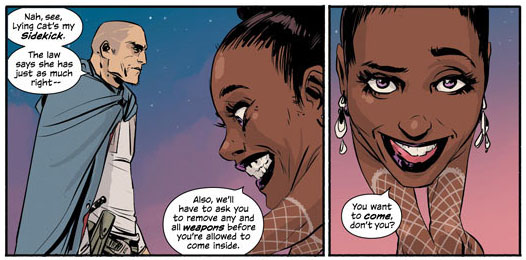 The Sextillion is a scene at the opening of the #4 where these malformed caricatures of women come to the book's Heroic Man of Action and promise him outrageous sex. Any darkness to the "character visits whorehouse" character beat is defused by Staples-- she hyper-exaggerates the female form, such that the whores are all legs, giant heads. Because that's what comic artists do, after all-- they take the sex characteristics that they obsess over and then inflate those, beyond any point of recognition. The Man of Action hasn't just gone to a whorehouse-- he's gone to a whorehouse that might as well have been run by Judd Winick. Staples does that but without choosing the same sexual characteristics-- invokes the grotesque, without accidentally titillating us with breasts, ass, camel toe, hormones, shame.
The Sextillion is a scene at the opening of the #4 where these malformed caricatures of women come to the book's Heroic Man of Action and promise him outrageous sex. Any darkness to the "character visits whorehouse" character beat is defused by Staples-- she hyper-exaggerates the female form, such that the whores are all legs, giant heads. Because that's what comic artists do, after all-- they take the sex characteristics that they obsess over and then inflate those, beyond any point of recognition. The Man of Action hasn't just gone to a whorehouse-- he's gone to a whorehouse that might as well have been run by Judd Winick. Staples does that but without choosing the same sexual characteristics-- invokes the grotesque, without accidentally titillating us with breasts, ass, camel toe, hormones, shame.
 Staples's approach resembles that Frank Miller took in Dark Knight Strikes Back, his own assault on mainstream comics. Unlike Miller, though: Vaughan/Staples's deformed women seem to build to something resembling a fucking point.
Staples's approach resembles that Frank Miller took in Dark Knight Strikes Back, his own assault on mainstream comics. Unlike Miller, though: Vaughan/Staples's deformed women seem to build to something resembling a fucking point.
Because at the heart of this whorehouse, its secret, buried desire? At its core is a young girl. Like van candy young.

That at the heart of the desire to malform women, to misshape them, to refuse to see them as human-- to describe what others dismiss as "cheesecake" as not just gross, but pre-sexual, anti-sexual, evidence of a retarded sexuality...? "It made me feel like a 10 year old again," said the Venn diagram overlap of a review of the Avengers and some creepy fucko molesting a little kid.
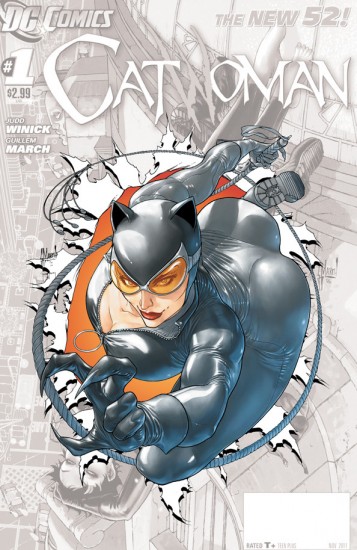 Dear comics: pretty sure Brian K. Vaughan and Fiona Staples just called you all pedophiles. Co-signed, but have a summah.
Dear comics: pretty sure Brian K. Vaughan and Fiona Staples just called you all pedophiles. Co-signed, but have a summah.
The other thing I dig about SAGA: it doesn't even have a high concept really.
I mean, maybe you could cram SAGA into a one sentence elevator pitch but you'd be leaving out .. well, everything because you'd be leaving out Staples, right? I don't think that's a small thing because I think of the "Comics with One-Sentence High Concept" to be a thing with Vaughan, a marker of his early career. EX MACHINA was "superhero becomes mayor"; Y THE LAST MAN was "world without men." SAGA doesn't have that. I don't think that's because Vaughan couldn't think of one-- he writes screenplays now; that's part of that gig.
I didn't like Y THE LAST MAN and I didn't like EX MACHINA, but I would never dream of missing the first issue of SAGA because the first issues of Y THE LAST MAN and EX MACHINA were two of the best first issues I've ever seen, technically. From a technical perspective, I'm not sure who has ever written first issues as well as he did, as consistently as he did: everytime, he (1) laid out a concept in its entirety, that (2) seemed like retailers wouldn't have to struggle too much to describe to their customers, but also (3) introduced all of the key characters, (4) told a complete story, (5) most significantly, teased future stories that sounded like they might be pretty interesting, and (6) ended with a cliffhanger for the next issue.
Would Y THE LAST MAN have stuck for people without that first issue being what it was? We've had 10 years of consistent failures from Vertigo after that suggest the answer might be no.
But since those issues were published, I think what Vaughan did with them may have gotten deconstructed, but only in that sloppy way things do. I think Vaughan has been wildly influential, but for comics maybe he'd want to disown if he were aware of them, for that horrid formula of "here's the first issue that lays out some ordinary schmoes, then end with the big cliffhanger that sets out the high concept." Go look at any movie-pitch independent comic.
Let's a pick a specific example because I like being a jerk because no repercussions, thanks internet-- go look at the first issue of that SAUCER COUNTRY comic, from Vertigo. Not a bad first issue-- I like Paul Cornell, I like Ryan Kelly; see above, re Sorkin multiplied by a very, very big number, but not a wholly unlikable thing. But: did you hear an echo of Vaughan in that? Regardless of what it's contents were, the first issue of SAUCER COUNTRY is written the same way a million bad independent comics have been written in the last few years-- first page is nothing interesting happening (how this become a fucking omnipresent feature of modern comics, I have no idea), build to an opening splash, a bunch of dialogue scenes teasing and hinting at some greater story, MAYBE one "action scene," maybe so the creative team can pat themselves on the back about comics not having a budget, and then end on a full-page splash setting out a cliffhanger premise, and congratulations-- you now know exactly what you already knew if you read any of the promotional material, and not one tiny inch more.
That's not just SAUCER COUNTRY-- that's... that's a LOT of "independent comics," right? Is it just me? I feel like that shit is to Vaughan what TWO DAYS IN THE VALLEY is to PULP FICTION. How much does SAGA reflect Brian Vaughan making a comic responding to years of independent comics that were trying to be Brian Vaughan comics? How much is SAGA to Brian Vaughan what the post-WATCHMEN America's Best Comics apology-comics were to Alan Moore?
Vaughan doesn't seem like an angry guy, in letter pages or what have you, but despite the surface cute... SAGA feels angrier than his other comics. ... Or maybe angry isn't the right word-- upset, anxious, rattled?
The lovey-dovey new parents: by issue 4, the father's admitting to the mother the details of other girls he fucked before her. The Sextillion sequence I mentioned above: that all happens because the Man of Action wants to be dominated sexually. Issue 3: dead kids, butchered kids. The cute robot-magic war at the book's core feels like it's been going on too long to be too adorable; we haven't seen much of the war in SAGA, but from the book's margins, it feels war-crime soaked.
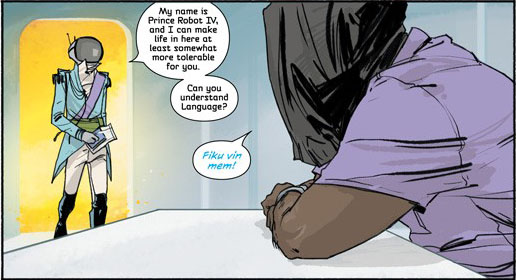 Other Vaughan comics I've seen have had violence in them, but they haven't felt violent in the way SAGA has. Whatever its detriments, parental anxiety makes for good comics, I guess.
Other Vaughan comics I've seen have had violence in them, but they haven't felt violent in the way SAGA has. Whatever its detriments, parental anxiety makes for good comics, I guess.
And if you've read about SAGA, you've invariably heard about the lettering, but yes, yes, the lettering. Vaughan went to Hollywood, but came back from it with a comic book with comic book pleasures to it. Instead of a broken thing.
How often does that happen? Kyle Baker came back different, but Kyle Baker 2.0 (and 3.0 and 4.0) were all pretty great. Besides that... anyone want to rep Frank Miller 2.0 being > Frank Miller 1.0? Some people make a case for Chaykin, and... good luck to them on that. Anyone want to read Neil Gaiman's Marvel comics? It's not a long list.
What interested me by the earlier issues of SAGA is that it seemed like Vaughan came back from LOST believing in the magic of arbitrary bullshit. If SAGA's universe has a lot of rules to it, they're not super-apparent so far, let's say. And good, fine-- I don't want rules getting in the way of Staples, of the designs. And I guess I have to admit arbitrary bullshit works. I watched LOST; I watched stupid-ass BATTLESTAR GALACTICA; I'm watching GAME OF THRONES-- didn't learn my lesson. LOST was a saga of sorts by creators who sure didn't/don't seem very interested in being bound by any system of logic, and who ultimately seemed hostile to having wrap things up with any kind of bow. "Throw Sayid in a pool of water that resurrects people. I know-- the Alien comes from a pool of black water . I have an idea for a sequel to DO THE RIGHT THING-- spoilers, it involves Danny Aiello wading into a pool of water..."
With Y THE LAST MAN, with EX MACHINA, Vaughan's first issues posed "Big Questions" for the series to answer. I think it's interesting Vaughan's first comic after working on that show is not a thing with any great road map announced up front-- no one's asking what's making sounds out in the jungle, or where the island is-- but one more totally committed to Arbitrary Bullshit, upfront. I don't like to admit I like Arbitrary Bullshit, but I just started watching PERSON OF INTEREST over the summer anyway and oh my god it's pablum yaywheewhazoo...
My favorite Vaughan thing was during his Hollywood period, a screenplay he wrote-- used to float around the internet back when screenplays floated around the internet more-- called ROUNDTABLE. ROUNDTABLE was a modern-day action comedy that nailed the tone, the appeal of something like GHOSTBUSTERS: ordinary schlubs, forced to face down a supernatural darkness way out of their league. I thought it was a heck of a good time. The appeal of ROUNDTABLE is the same as the appeal of SAGA, the bedrock appeal, an appeal that other comic creators of Vaughan's generation seem to keep missing: people connecting with one another.
I'm not loving getting older-- getting old sure seems kinda shitty, you guys. But what I do like, what I have enjoyed is that reveal of things that seem complicated as a younger person becoming boring and things that seem simple becoming more interesting. People getting married? People starting families; people forming communities; people finding one another. It's nice. It's a nice thing. Those things might sound simple, but they're not, they're not terrible things for stories to be about, they aren't undramatic things.
SAGA seems interested in those things, and I don't know I can say that's very common for this kind of serial adventure comic. They're not subjects that SCARLET is interested in, CASANOVA is interested in, FATALE is interested in, any Mark Millar comic ever, ever, is interested in, any of the lame Jonathan Hickman Image comics I've read recently are interested in (p.s. jes-us, people, come on, COME ON); and so on and so forth.
Whatever escape route you devise, I don't think it's going to work without a team. Unless you can get nitroglycerine-- that stuff's pretty awesome.
Maybe you're saying, "You like SAGA because you're deluding yourself into believing it's on your side in some nonsensical war that exists only in your head," right about now.
I'd cop to that. But I don't know-- that's what great comics all feel like to me...? Is that weird? I was rereading Ann Nocenti DAREDEVIL's and Walt Simonson THOR's these last few months and that's what those all felt like to me back when they first come out and that's what they still feel like me now. I guess that's what it looks like when I dig comics...? Do you do this? I do this.
I guess it's a little ugly, an ugly thing to do, but ... you should see what it looks like with how I feel about 7-11 creme-filled cookies. It looks like me getting fat and dying alone. They're so fucking delicious, though-- the key is that 7-11 doesn't care if you live or die so all the stuff you shouldn't eat if you care about your life, ends up in that creme and making that creme all tasty.
In conclusion, I just want to be pretty, but I'm too weak. Awwwww.
NEXT
Not next week but anyone have a preference what to cover, when I do another one of these? I've read a lot of Image books-- if anyone's got a preference on one of those, let me know. Should I be reading anything from anyone else?
ALSO
You can buy SAGA #1 through #4 (and beyond) at Brian's digital shop if you don't have a comic store in walking distance-- there's previews and stuff, too. Contrary to anything you might have heard, I assure you that at least as far as I know, none of the money generated will be going directly to human trafficking. I can almost very nearly maybe guarantee-ish that we're running a human-trafficking free operation, so if you hear otherwise, those are probably, probably just vicious lies, probably.
















